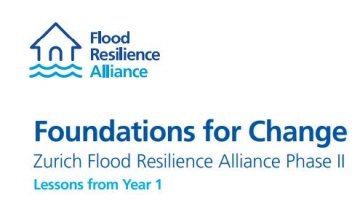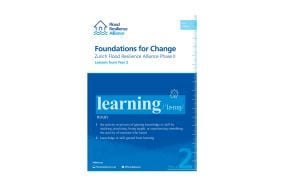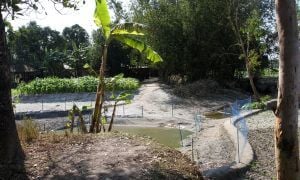
Read our 2024 annual report

Knowledge Hub
Foundations for change: what we've learned in year one of the Zurich Flood Resilience Alliance project
Phase II of the Zurich Flood Resilience Alliance was launched in July 2018.

The first year largely focused on setting up the internal systems and structures to achieve our broader objectives. Combining investment in these systems and structures with leveraging Phase I successes is already leading to promising contributions to flood resilience policy and practice globally.
This learning report presents what we have learned about best-practice working as an Alliance and what that set-up is allowing us to accomplish. We have found that delivering resilience programming that achieves lasting, systems-level change requires functioning resiliently — principally to be flexible, adaptive, diverse, and collaborative.
In setting up Phase II of the Alliance, we have intentionally considered and built these characteristics into our internal systems, processes, and ways of working. This effort, in turn, is enabling the collective action required for achieving lasting, beneficial changes in flood resilience spending, policy, and practice.
What change have we achieved?
Despite this first year largely being a set up phase, our success includes influencing the commitment of nearly 24 million USD and the disbursement of over one million USD for flood resilience. In the process of implementing the Flood Resilience Measurement for Communities (FRMC) we have directly engaged with, and built the capacity of over 4,400 people. This engagement will lead to interventions that will benefit more than 115,000 residents across the communities we work in.
We have also made progress in areas which will enable us to see change take place over coming years. Over the past year we have finalised and rolled out the next generation of the FRMC in seven languages and started implementation in 70 communities across 8 countries. We have raised the profile of the Alliance, developed relationships with diverse stakeholders, accessed policy dialogues on global and national levels, and integrated our messages into high level policy recommendations. We have also developed research and knowledge outputs which have achieved widespread readership, successfully influenced national level flood resilience and funding, and influenced external replication and scaling of the FRMC.
What lessons can we share?
The role of Zurich in the Alliance is not that of a traditional donor, but also a partner adding weight, topical knowledge and visibility as a global corporation. Based on the opportunities we are experiencing as a result of Zurich’s engaged partnership, we want to encourage more donors to adopt this type of non-traditional donor role.
The long-term systemic change we are seeking requires working across multiple sectors and scales. Our workstream structure supports sector specific work, while cross-workstream collaboration allows us to aggregate that work to deliver shared objectives.
Our work illustrates that flexible, holistic programmes, informed by local contexts, are vital to achieving innovative results. Zurich’s long-term funding model, coupled with flexible programming and community-driven intervention selection, has already resulted in new practices, community ownership of results, and scaling by communities and national government alike. This is further supported by our systems thinking approach, which has helped us build the capacity of internal partners and external actors to explore problems more holistically, to understand the interconnections, and to see new entry points for action.
However, this approach does not necessarily fit within traditional impact measurements. Measuring input and output is easy but to fully assess the impact of long term resilience programmes like the Alliance we need to capture not only lives improved and dollars spent but also ‘intangibles’ such as the knowledge gained regarding key vulnerabilities and risks.
We believe that these insights illustrate a new way forward for implementing programmes that are beneficial for communities and organisations alike. To deliver such programming differently from business-as-usual, to truly tailor it to local needs and contexts, we need funding that provides the time and flexibility needed for innovation and learning. We hope that our demonstration of success in this new way of working will push the wider resilience sector to take a chance, to experiment, and to learn and adapt.
Resources
For more details on some of these achievements and lessons learned see the Executive Summary and Full Report and a blog post on the Flood Resilience Portal.
Members of the Zurich Flood Resilience Alliance are funded by the Z Zurich Foundation, with the exception of Zurich Insurance Group. However, the views expressed in this publication do not necessarily reflect the official position of either the Foundation or the company.




